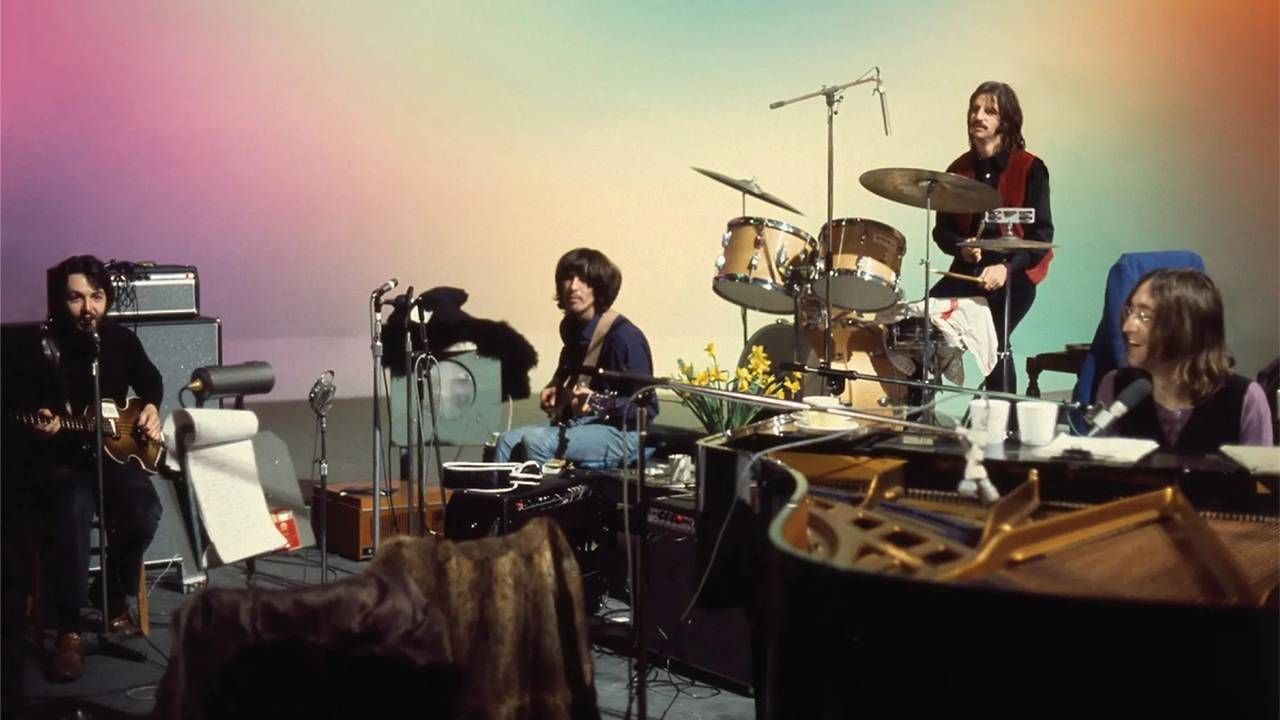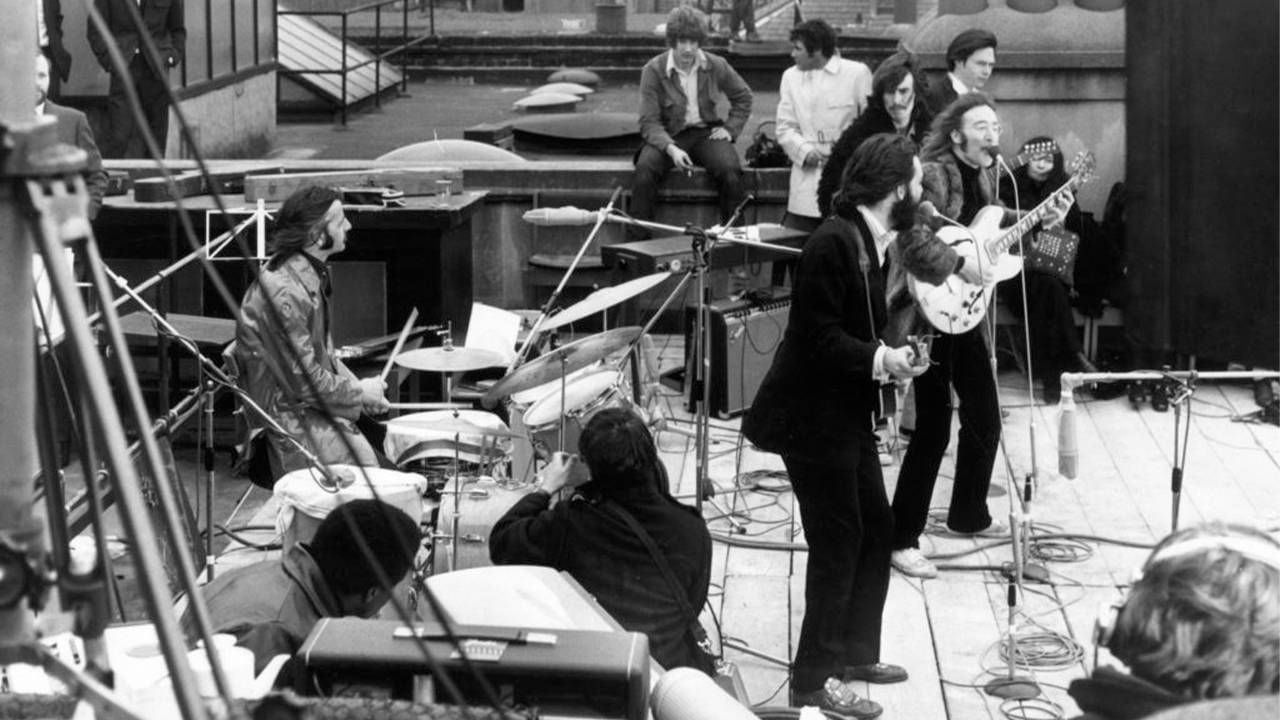The Beatles Try to ‘Get Back’ With Peter Jackson’s Film
The most depressing chapter in the history of The Beatles is getting a much more upbeat look
Oscar-winning director Peter ("Lord of the Rings") Jackson's new, ballyhooed seven-hour film, "The Beatles: Get Back" prompts a thorny question: Can Jackson take viewers on a magical mystery tour of the film and manage to rewrite what has been labeled as the most depressing chapter in the history of the world's most acclaimed and admired rock and roll band?

To make sense of Jackson's daunting task, we must take a step back and try to understand this bewildering saga.
The Long and Winding Road
"The Beatles: Get Back" has its origins in January 1969, when John Lennon, Paul McCartney, George Harrison and Ringo Starr gathered to record a new album, "Let It Be." The hook this time was that a film crew would capture the men in rehearsals, with the adventure climaxing in The Beatles giving their first concert since they'd stopped touring in August 1966 and releasing the "Let It Be" film in 1970.
But the project seemed cursed from Day One, Jan. 2, 1969. It didn't help that the inveterate night-owl musicians had to report very early in the morning – and in the grip of a typically long, cold British winter -- to accommodate the needs of the film crew.
Remember, they had just finished five months of work on the 30-song "White Album," the only two-record set in their history, only 2 1/2 months before.
Further, the guys were not feeling particularly inspired or creative that month. Who could blame them?
They had just finished five months of work on the 30-song "White Album," the only two-record set in their history, only 2 1/2 months before. In fact, Lennon and McCartney literally worked for 24 hours straight on Oct. 17-18, 1968, deciding on the running order of the songs and approving final mixes.
Not only were the four men understandably pooped (and should have logically taken more time off to decompress before embarking on a new ambitious project), the pressure of making an album on such short notice meant that they hardly had time to compose much new material.
Lennon was particularly flummoxed. His contributions to the "Let It Be" album were ghosts of his best and most dedicated work.
There was a rocker with stream of consciousness lyrics entitled "Dig a Pony." The Beatles dredged up an unfinished one-year-old song called "Across the Universe" -- and two throwaway, jokey tunes called respectively, "Dig It" (in which Lennon shouted out words on the spot) and "Maggie Mae" (a very old Liverpool ditty that was so ancient it well preceded the advent of The Beatles).
Lennon was so out of inspiration to create magic that The Beatles even resorted to reworking an unreleased screamer from 1963 – six years earlier, mind you -- called "One After 909."
Then there were the musicians' bad vibes, which permeated the recording sessions for the "Let It Be" project. Lennon looked distracted and disinterested for much of the original movie – while watching "Get Back," you can draw your own conclusions about what influence he may have been under, beyond that of his new girlfriend and soon-to-be-wife, Yoko Ono.
Tensions Between The Beatles on Display
McCartney was shown to be domineering, if not outright bossy, especially in one memorable scene when Harrison bristled on camera at McCartney's relentless coaching on how he should play the guitar.
For his part, Harrison was so bummed out by McCartney's nagging and lack of interest in recording Harrison's new songs that he took the extraordinary step of walking out on the sessions and stayed away for nearly a week, forcing the quartet to carry on as a trio.

And Starr? He gamely tried to get by with a little help from his friends – but not much was forthcoming, and he perpetually looked withdrawn and glum on camera.
The result was the 80-minute film "Let It Be," released in the spring of 1970, a full 15 months after the recording sessions had taken place.
As a matter of fact, the "Let It Be" film was so crusty by the time of its release that McCartney had already announced the band's breakup several weeks earlier, giving the movie a melancholy, anticlimactic feel. It was accompanied by the album of the same name, which turned out to be the final release of original compositions by the band.
The album itself was considered to be an afterthought, following the brilliance and freshness of its predecessor, "Abbey Road," which had come out in September 1969.
Director Peter Jackson's Quest
Now, with "Get Back," lifelong Beatles fan Jackson has the task of presenting a new new movie – and changing public opinion.
It won't be easy. Beatles fans have concluded for five decades that the recording sessions that resulted in, first, "Let It Be" and now, "The Beatles: Get Back," were so shrouded in unhappiness that they foreshadowed the breakup of The Beatles.
Undeterred, Jackson has recently insisted in interviews that the miles of previously unseen footage he unearthed from the vaults at Beatles headquarters shows a very different atmosphere. Jackson says that the legend is false, and that John, Paul, George and Ringo were actually cheerful and happy to be working together. Could it be?
Could it be that we have been dead wrong for 51 years? Is it possible that the original movie was skewed to show the worst of the sessions so the critics and public would forever determine that the karma was rotten in January of 1969?
What if the new, three-part film convinces us that John, Paul, George and Ringo actually resembled the carefree Liverpool lads of "A Hard Day's Night" and "Help!" and not the gloomy guys that we have associated with this period?
Jackson will have seven hours to present his case – and an enormous ace up his sleeve: the immense popularity of a group that has never gone out of style.
Jackson says that the legend is false, and that John, Paul, George and Ringo were actually cheerful and happy to be working together.
Generations come and go – boomers, Gen X, Gen Y, Gen Z – but Beatles' music remains vibrant and hugely commercially successful.
In 2000, for example, The Beatles' management released an album called "1," consisting of the band's No, 1 singles, 30 years after the band broke up. The album went to No. 1 on music charts worldwide and sold some 31 million copies.
If you need further evidence of the staying power of The Beatles, consider that Paul McCartney's new memoir, "The Lyrics," in which he discusses how he came to write many of his songs since 1956, has shot to the top of The New York Times' bestseller list.
I have a more personal account. When Stony Brook University invited its designated Honors students to sign up for my class next semester, entitled The Beatles: Their Music, Legacy and History, all 19 seats in the class sold out within the first 48 hours.
Jackson has another built-in advantage: the music. Despite all of the supposed negativity, the group did lay down some classics, albeit all written primarily by McCartney.
It's hard to find faults with the sessions that spawned three No. 1 hits: "Get Back," "Let It Be" and "The Long and Winding Road." Plus, the catchy tune "Two of Us" probably could also have been a smash, had The Beatles decided to put it out as well as a single at the time.
When you think about it, the words "let it be" conjure up what we have always thought the project of the same name was: a solemn call of resignation.
The exhortation to "get back," on the other hand, inspires us.
OK, then, let's get back to happy, joyful times -- where we and The Beatles once belonged!
Jon Friedman, who teaches The Beatles: Their Music, Influence and Legacy at Stony Brook University, is the author of the Miniver Press ebook "Goo Goo Ga Joob: Why I Am the Walrus Is The Beatles’ Greatest Song." Read More

